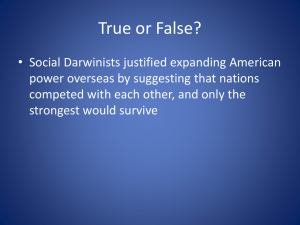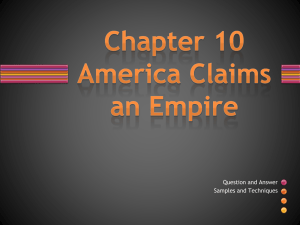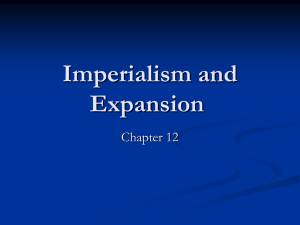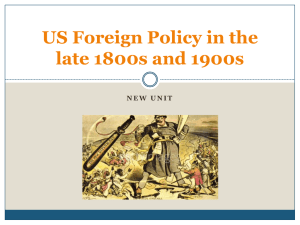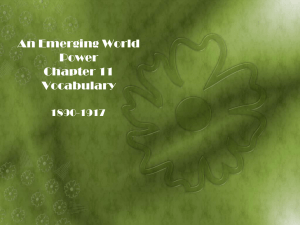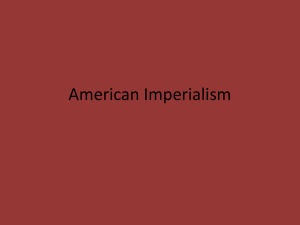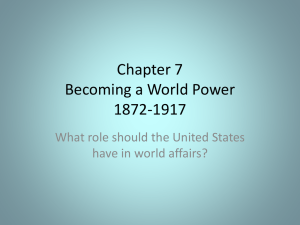2010 wayzata ap® united states history free
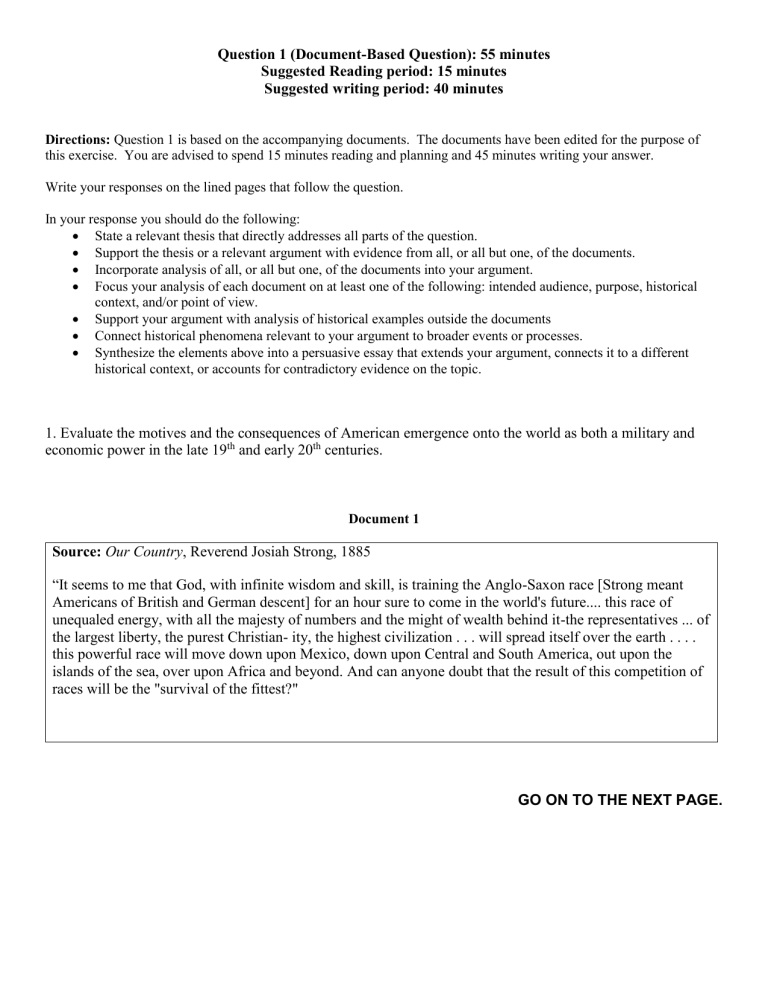
Question 1 (Document-Based Question): 55 minutes
Suggested Reading period: 15 minutes
Suggested writing period: 40 minutes
Directions: Question 1 is based on the accompanying documents. The documents have been edited for the purpose of this exercise. You are advised to spend 15 minutes reading and planning and 45 minutes writing your answer.
Write your responses on the lined pages that follow the question.
In your response you should do the following:
State a relevant thesis that directly addresses all parts of the question.
Support the thesis or a relevant argument with evidence from all, or all but one, of the documents.
Incorporate analysis of all, or all but one, of the documents into your argument.
Focus your analysis of each document on at least one of the following: intended audience, purpose, historical context, and/or point of view.
Support your argument with analysis of historical examples outside the documents
Connect historical phenomena relevant to your argument to broader events or processes.
Synthesize the elements above into a persuasive essay that extends your argument, connects it to a different historical context, or accounts for contradictory evidence on the topic.
1. Evaluate the motives and the consequences of American emergence onto the world as both a military and economic power in the late 19 th
and early 20 th
centuries.
Document 1
Source: Our Country , Reverend Josiah Strong, 1885
“It seems to me that God, with infinite wisdom and skill, is training the Anglo-Saxon race [Strong meant
Americans of British and German descent] for an hour sure to come in the world's future.... this race of unequaled energy, with all the majesty of numbers and the might of wealth behind it-the representatives ... of the largest liberty, the purest Christian- ity, the highest civilization . . . will spread itself over the earth . . . . this powerful race will move down upon Mexico, down upon Central and South America, out upon the islands of the sea, over upon Africa and beyond. And can anyone doubt that the result of this competition of races will be the "survival of the fittest?"
GO ON TO THE NEXT PAGE.
Document 2
Source: Charles Conant, American financial expert, 1898
“This new movement [imperialism] is not a matter of sentiment. It is the result of a natural economic law and race development. The great
civilized peoples have to-day at their command the means of developing the decadent nations of the world. What this means, in its material
effects, is the great excess of saved capital which is the result of machine production . . .there must always be savings in a progressive industrial society to repair the wear of existing equipment and to meet new demands, but under the present social order it is becoming imperible to find at home in the great capitalistic countries employment for all the capital saved which is at once safe and remunerative . . . .
For the means of finding new productive employments for capital, it is necessary that the industrial countries should turn to countries which have not felt the pulse of modern life. Such countries have yet to be equipped with the mechanism of production and of luxury, which has been created in the progressive tries by the savings of recent generations.”
Source: War Message , William McKinley, 1898
Document 3
“The present revolution is but the successor of other similar insurrections which have occurred in Cuba against the dominion of Spain, extending over a period of nearly half a century, each of which, during its progress, has subjected the United States to great effort and expense in enforcing its neutrality laws, caused enormous losses to American trade and commerce, caused irritation, annoyance, and disturbance among our citizens, and, by the exercise of cruel, barbarous, and uncivilized practices of warfare, shocked the sensibilities and offended the humane sympathies of our people.
GO ON TO THE NEXT PAGE.
Document 4
Source: Mark Twain, The Greatest American Humorist, Returning Home, New York World , 1900
“You ask me about what is called imperialism. Well, I have formed views about that question. I thought we should act as [the Filipinos’] protector -- not try to get them under our heel. We were to relieve them from
Spanish tyranny to enable them to set up a government of their own, and we were to stand by and see that it got a fair trial. It was not to be a government according to our ideas, but a government that represented the feeling of the majority of the Filipinos, a government according to Filipino ideas. That would have been a worthy mission for the United States. But now -- why, we have got into a mess, a quagmire from which each fresh step renders the difficulty of extrication immensely greater. I'm sure I wish I could see what we were getting out of it, and all it means to us as a nation.”
Document 5
Source: “The Platt Amendment,” 1903
"I.-That the government of Cuba shall never enter into any treaty or other compact with any foreign power or powers which will impair or tend to impair the independence of Cuba, nor in any manner authorize or permit any foreign power or powers to obtain by colonization or for military or naval purposes or otherwise, lodgement in or control over any portion of said island."... "III. That the government of Cuba consents that the United States may exercise the right to intervene for the preservation of Cuban independence, the maintenance of a government adequate for the protection of life, property, and individual liberty, and for discharging the obligations with respect to Cuba imposed by the treaty of Paris on the United
States, now to be assumed and undertaken by the government of Cuba."
Document 6
Source: President Theodore Roosevelt, December 6, 1904
“It is not true that the United States feels any land hunger or entertains any projects as regards the other nations of the Western Hemisphere save such as are for their welfare. All that this country desires is to see the neighboring countries stable, orderly, and prosperous... If a nation shows that it knows how to act with reasonable efficiency and decency in social and political matters, if it keeps order and pays its obligations, it need fear no interference from the United States. Chronic wrongdoing, [however,]... may... ultimately require intervention by some civilized nation, and in the Western Hemisphere the adherence of the United States to the Monroe Doctrine may force the United States, however reluctantly..., to the exercise of an international police power...”
GO ON TO THE NEXT PAGE.
Source:
“A Hint”: Washington Star, 1907
Document 7
END OF DOCUMENTS FOR QUESTION 1
Prompt : Evaluate the motives and the consequences of American emergence onto the world as both a military and economic power in the late 19th and early 20th centuries.
SCORING NOTES
Thesis : Possible thesis statements could include the following
Motives can include o o o o o
Economic Reasons: new markets, employment for capital, more resources, etc
Humanitarian Reasons: civilize the uncivilized
To distract Americans from domestic troubles and frustrations
Increasing trade opportunities
Competition for power (not wanting to fall behind other imperialist nations)
Consequences can include
Emergence of America as a police power o o o o o
Greater involvement in the economies of other nations
Embroiled the US into the politics of the Far East and Latin America more than in the past
Division within the country between pro and anti- Imperialists.
Questioned traditional American values (Oppressed colonial nations within corrupt empires were fighting for their own freedom that America had promised them)
Analysis of Documents
As explained in the scoring notes, to earn full credit for analyzing documents, responses must include at least one of the following for all or all but one of the documents: intended audience, purpose, historical context, author’s point of view. Although examples of these elements are listed below, these examples of analysis must explicitly be used in support of a stated thesis or a relevant argument.
Document 1
Source: Our Country , Rev. Josiah Strong, 1885
Historical Context: Industrial Revolution, Berlin Conference regulates colonization of Africa, America is gaining Pacific islands as landholdings, Social Darwinism introduced.
Audience: Attendees of mass, other Social Darwinists and pro- imperialists.
Purpose: To demonstrate that America will spread its ideals across the globe, almost like a global Manifest
Destiny.
Point of View: Social Darwinist, pro-imperialist, as a reverend he would be driven to spread Christianity.
Being of Anglo-Saxon descent, he would naturally also believe in the idea of white supremacy
Document 2
Source: Charles Conant, American financial expert, 1898
Historical Context: American companies were producing more goods than the country could support and
exports were subject to high tariffs in other civilized countries, Spanish-American War and sinking of the
U.S.S. Maine
Audience: American readers and policymakers
Purpose: To persuade Americans of the economic necessity of American expansion overseas
Point of View: As an expert on banking and finance, Charles Conant believed that American foreign policy had to become more interventionist overseas to preserve a favorable environment for corporate investment at home
Document 3
Source: War Message, William McKinley, 1898
Historical Context: After the explosion of the USS Maine, before the Spanish War, US experiencing
economic losses due to turmoil in Cuba. Sparked by yellow journalism.
Audience: People of the United States, Congress.
Purpose: To persuade Congress to declare war on Spain, to stabilize Cuban economy.
Point of View: As president, McKinley worked for the nation and its interests. He was supported and therefore influenced by big business who was affected by turmoil in Cuba.
Document 4
Source: Mark Twain, The Greatest American Humorist, Returning Home, New York World, 1900
Historical Context:
End of imperialism, Filipino involvement and the “Philippines Question”
Audience: American readers
Purpose: To encourage Americans to withdraw their control from the Philippines and to discourage the entire establishment of imperialism
Point of View: As a very well-known author and political speaker, Twain was well-informed of the current political issues, and he was strongly against imperialist intervention in the Philippines. He was also a member of the Anti-Imperialist League.
Document 5
Source: “The Platt Amendment,” 1903
Historical Context: After Cuban Revolt and the Spanish-American War. American troops remained in Cuba to “prepare” for its eventual independence. Meanwhile, Cuba was in the process of creating their own constitution but made no reference to the United States.
Audience: People of Cuba
Purpose: To ensure US dominance over Cuba by incorporating its terms into the Cuban constitution.
Point of View: Implemented by Congress who supported imperialism. Recognized that dominance over
Cuba was not only an opportunity to expand the American empire but also to continue America’s flourishing economic relations with Cuba.
Document 6
Source: President Theodore Roosevelt, December 6, 1904
Historical Context: Dollar Diplomacy in Latin America, fearing Spanish control of Cuba
Audience: general United States public
Purpose: Justify U.S. intervention in Latin America
Point of View: Teddy Roosevelt, a republican who advocated for global expansion as did Henry Cabot
Lodge, believed that America was strong and ready to defend its interests around the world, so he wanted to create an American empire in Latin America as a means of competing with the increasing imperialism of
European nations
Document 7
Source: “A Hint”: Washington Star, 1907
Historical Context: Dollar diplomacy in Latin America, Panic of 1907, Imperialistic support as evident in
the Roosevelt corollary
Audience: Washington Star readers, Americans
Purpose:
To present America as the superior power and to discourage “inferior” Latin American nations from intervening in American imperialism and affecting America from their political arguments
Point of View: Drawn by Americans who supported imperialism, main newspaper for Washington D.C
Analysis of outside examples to support thesis/argument
Possible examples of information not found in the documents that could be used to support the stated thesis or a relevant argument could include the following.
“Yankee Imperialism”
White Man’s Burden
Social Darwinism
Idea of the New Manifest Destiny
Monroe Doctrine
Imperializing in Hawaii and Samoa
Annexation of Puerto Rico and the flourishing sugar economy
Foraker Act and Jones Act
Dollar diplomacy
Alfred Thayer Mahan’s The Influence of Sea Power upon History
“Big Stick” Diplomacy
Roosevelt Corollary
Ostend Manifesto
Isolationism pre-World War I
Yellow journalism in garnering support for imperialistic actions
Bombing of the USS Maine and letter from Dupuy de Lome
Pan-American Congress
Missionaries
Closing of the Western Frontier
Insular Cases
Increasing importance of trade
Open door policy
Shipbuilding program: US was in 5th place among world’s naval powers by 1900
Philippines Question
Anti-Imperialist League
Philippine War
Contextualization : Students can earn a point for contextualization by accurately and explicitly connecting historical phenomena relevant to the argument to broader historical events and/or processes. These historical phenomena may include, but are not limited to, the following.
Agrarian unrest which created Populism and free silver crusade
Panic of 1893
William Jennings Bryan and “Cross of Gold” speech
Closing of the western frontier
Labor disputes
Industrial Revolution- Need for raw materials.
The race to imperialize between European nations, particularly in Africa
Synthesis: Essays can earn the point for synthesis by crafting a persuasive and coherent essay. This can be accomplished by providing a conclusion that extends or modifies the analysis in the essay, by using disparate and sometimes contradictory evidence from primary and/or secondary sources to craft a coherent argument, or by connecting to another historical period or context. Examples could include, but are not limited to, the following
Linking imperialism to Manifest Destiny and westward expansion o American experience with the subjugation of Native Americans set precedent
Linking imperialism to the Industrial Revolution o The technological advances of the Industrial Revolution caused an increased need for raw materials that encouraged the rise of European imperialism.
Linking Josiah Strong to Manifest Destiny and Cold War policies.
Linking US emergence as a police power to America during the Cold War
Linking the end of imperialism to the start of “Moral” Diplomacy o Turning away from brutal tactics during imperialism, as in the Philippines
Sample Essay
As the expansion in the western frontier came to an end, the United States began looking overseas to meet its needs and ambitions. Meanwhile, European powers were rapidly competing for colonies, as evident in
Africa. Wanting to become an imperialist power, themselves, the American public and policy makers began their own conquest of expansion in Spanish colonies like Cuba, Puerto Rico, and the Philippines. Aside from the fear of falling behind other imperial nations, the United States was motivated by both humanitarian and economic interests. As a result, American imperialism allowed the United States to become more involved in the politics and economies of other nations, as in the islands of Cuba and Puerto Rico. Moreover, it also led to a rift within America between those who supported imperialistic actions and those who were against it.
Ultimately, out of the events in the late 19th and early 20th centuries, America emerged as a military and economic power in the world.
The United States was motivated by a variety of factors, all of which led to its emergence as a military and economic power in the world. In part due to ideas of white supremacy, Americans believed it was their duty to civilize those considered uncivilized. For example, Reverend Josiah Strong, in Our Country , stated that
America should spread its ideals across the globe (Doc. 1). As a reverend, Strong would be in favor of spreading Christianity to the rest of the world; thus, he was supportive of imperialism. Furthermore, the idea of spreading America’s values to the rest of the world and helping uncivilized nations, such as the Philippines, become civilized was evident in Rudyard Kipling’s, the “White Man’s Burden,” which stressed the responsibility of the white race to bring care, education, and culture for subject people of other races in its colonial possessions. This motive, however, was seen by many, particularly by anti-Imperialists, as more of a justification for imperialism rather than a true motive. A true motive that cannot be doubted was America’s increased interest in new markets, in employment for capital, in resources, and in trade opportunities abroad.
Charles Conant, a financial expert, persuaded Americans of the economic necessity of overseas expansion, for
American companies were producing more goods than the country could support and exports were subject to high tariffs in other civilized countries (Doc. 2). By creating a favorable trade between the United States and these “uncivilized” nations, it would open up markets that would otherwise be underused. As an expert on
banking and finance, Charles Conant believed that American foreign policy had to become more interventionist overseas to preserve a favorable environment for corporate investment at home. Furthermore, the economic motivations that drove America to expand can be seen in William McKinley’s “War Message,” in which he expressed the need to declare war on Spain in order to ensure that American economic interests in Cuba go unharmed (Doc. 3). However, McKinley’s decision was also influenced by public pressure due to the rise of yellow journalism, which sensationalized events like the explosion of the U.S.S Maine and the discovery of the
Dupuy de Lome letter in order to garner support for the war effort. Similarly, Washington Star ’s, “A Hint,” portrayed America as the superior power and discouraged Latin American nations from intervening in
American affairs (Doc. 7). America, however, had free reign in interfering in Latin America as seen in Taft’s
Dollar Diplomacy. This policy ensured America would continue its economic interests in Latin America and other nations by guaranteeing loans, which in turn would create a relationship of dependency and thereby, expand America’s power in the world. This foreign policy allowed America to intervene in Latin American countries in order to protect its economic interests abroad. Thus, Americans were driven by both humanitarian and economic reasons to expand as a military and economic world power.
As America rose to prominence as both a military and economic power, it began to increase its political and economic involvement in other nations. For one, the United States began to see themselves as the police power of the world. Theodore Roosevelt, for example, expressed the need for American intervention in countries that committed “chronic wrongdoings” (Doc 6). This was a direct reflection of his Roosevelt
Corollary, which established America’s right to use military force in order to restore stability in neighboring nations. However, Roosevelt, being an ardent supporter of global expansion, evident in his “Big Stick”
Diplomacy, also used this idea of a police power in order to justify and garner support for imperialistic actions.
Essentially, it was an attempt to portray America in a better light, rather than the image of a power-hungry country working for its own advantage. The United States also increased its political involvement in countries like Puerto Rico, which was occupied by American troops during the Spanish-American War. In 1900, the
United States passed the Foraker Act, which created a two chamber legislature and placed an American governor in charge of its government. In doing so, the United States could amend or veto any legislation that the
Puerto Ricans passed, thereby giving them immense power in the politics of the island. A similar event occurred in Cuba, where American troops still remained after the Spanish-American War. In Cuba, America worked to prepare the country for its eventual independence by funding the construction of roads, schools, and hospitals. When it became apparent that the United States was not going to be mentioned in the Cuban constitution, Congress stepped in and implemented the Platt Amendment as a way to ensure continued
American domination over the island. Among other things, the Platt Amendment barred Cuba from making treaties with other nations, which effectively gave the United States control over their foreign policy (Doc 5).
Not only did the United States essentially deprived Cuba of its political independence, it also took control over their rich sugar economy. By buying up the plantations and factories, as well as pouring investments into Cuba, the United States ensured that Cuba would remain dependent for years to come. Just like Cuba, Puerto Rico and
Hawaii also became appendages to the US economy.
In addition to the increased political and economic involvement of the United States in other nations, its imperialistic emergence into the world also caused a division within America between Anti and Proimperialists. Pro-imperialists envisioned United States being a worldwide empire and a leader in world affairs, which would allow them to create policies advantageous for America. Anti-imperialists, on the other hand, believed imperialism would harm the "cultural diversity" of both America and the other nations and deprive them of their rights and resources. In addressing the “Philippines question” that had become a heated debate during the time, Mark Twain, in The New York World , criticized American involvement in the Philippines, and urged Americans to remove themselves from the island (Doc 4). A member of the Anti-Imperialist League,
Twain saw involvement in the Philippines as going against the American values of liberty and democracy.
Similarly, William G. Sumner, member of the League and a leading Social Darwinist, believed also in the dangers of imperialism, fearing the effects of allowing an uncivilized and “savage” race to share a government with America. Interestingly, ideas of American identity was one idea anti and pro-imperialists had in common.
Both believed in the idea of white supremacy, although they used the concept in different ways. Nevertheless, arguments between anti and pro-imperialists dominated the politics of the time and divided the country.
Driven by humanitarian and economic motivations, the United States was able to emerge on to the global scene as both a military and economic power. As a result, there was a materialization of the idea that the
United States could serve as a police power in world affairs. This idea would continue to develop over time and
America would eventually be a true police power. During the Cold War, for instance, the United States used the
CIA to influence politics and to topple governments that they deemed unsafe. Moreover, America’s leadership in the United Nations, in which they worked to ensure peace in world affairs, proved to further testify of its growing emergence as a police power. Additionally, American imperialism also allowed for more economic involvement in other nations, and it also caused arguments between pro and anti-imperialists that divided the country.

